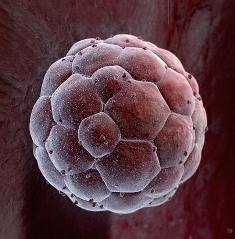November 18th, 2010 by Linda Burke-Galloway, M.D. in Better Health Network, Health Tips, Research, True Stories
2 Comments »


As more older women attempt to beat the biological clock and conceive, they are at greater risk for developing birth-related complications. For women over 45, there is less than a 1 percent chance of getting pregnant using their own eggs. Successful pregnancy for women over 45 is nearly always the result of in-vitro fertilization (IVF) and the use of an egg donor.
Researchers at Tel Aviv University reviewed birth records from 2000 to 2008, specifically looking at the records of 177 women who gave birth at the age of 45 and beyond. The majority of the women had IVF and received donor eggs, and 80 percent of the babies were delivered via cesarean section (C-section).
Despite their celebrity, Kelly Presley (age 47), Celine Dion (age 42), and Mariah Carey (age 40), are older pregnant women who are at risk. The premature birth of Celine Dion’s twin sons did not surprise me at all. Women over 35, and especially those over 45 with underlying medical problems, should be treated prior to becoming pregnant. I cannot emphasize this enough. Read more »
*This blog post was originally published at Dr. Linda Burke-Galloway*
October 17th, 2010 by Peggy Polaneczky, M.D. in Better Health Network, Health Policy, Humor, News, Opinion, True Stories
No Comments »

 There appears to be a new record for a cryopreserved embryo birth. From NPR:
There appears to be a new record for a cryopreserved embryo birth. From NPR:
In 1990 a couple underwent In Vitro Fertilization. They eventually had a healthy baby. They also, as is common, had a number of microscopic embryos that hadn’t been implanted, but were viable. They decided to anonymously donate them. Now, one of those embryos has produced a little boy, 20 years after being created.
In other embryo-related news, Colorado has another personhood rights bill (Amendment 62) on the ballot for November:
As used in sections 3, 6, and 25 of Article II of the state constitution, the term “person” shall apply to every human being from the beginning of the biological development of that human being.
So here’s my question: Under the proposed Colorado amendment, would this kid be legal to drink on his first birthday? I’m just sayin’…
Seriously, Colorado — just say “no” to Amendment 62. Its proponents plan to use it to try and outlaw birth control pills and IUDs.
*This blog post was originally published at tbtam*
October 11th, 2010 by RyanDuBosar in Better Health Network, Health Policy, News, Research
No Comments »

Medical organizations are donating heavily to doctors running for the U.S. House. Dentists, ophthalmologists, radiologists, surgeons, neurologists and ENTs have contributed heavily. The goal is to get doctors onto committees where they can have the most impact. So far, the candidates have trended heavily Republican and have, in at least one campaign, vowed to overturn healthcare reform. The stakes are high if opposing legislators succeed, because they could underfund or block portions of reform to the point that it works poorly or not at all. (Politico, New England Journal of Medicine)
Spurred by antibiotic resistance seen in almost every drug class, FDA Commissioner Margaret Hamburg, FACP, is turning the agency’s attention toward animal feed. With little to no development of new antibiotics in the pipeline, the agency is discussing regulations for animal feed and guidelines for human use. (Wall Street Journal)
Scientists should be able to use stem cells for biomedical research, according to a recent Harris Interactive/HealthDay poll. Almost three quarters of adults surveyed are in favor of using embryonic stem cells left over from in-vitro fertilization. These poll results remain consistent with a similar survey released in 2005. Read more »
*This blog post was originally published at ACP Internist*
June 1st, 2010 by Peggy Polaneczky, M.D. in Better Health Network, News, Opinion, Research
1 Comment »

In the latest media barrage on autism, fertility treatment has come into question as a possible cause for this increasingly common developmental disorder. The reason is two research abstracts recently presented at the International Meeting for Autism Research in Philadelphia.
One study assessed the history of IVF (in vitro fertilization) among 574 children evaluated at a special center for autism in Israel. The researchers found that 10% of the group diagnosed as autistic had had IVF, compared to a background rate in the overall population which they quote as 3.5%. Not surprisingly, maternal age was higher in the IVF group and the rate of prematurity was higher in the autistic children.
The second study was a look into a pre-existing database — the Nurse’s Health Study — which collects data from a cohort of nurses over time. The researchers compared the reproductive history reported by women who also reported having a child with autism and compared it to that of women who did not report having an autistic child. Of those with autistic children, 48% reported infertility with 34% having used ovulation inducing drugs, compared with 33% and 24%, respectively, in women without autistic children, a difference that was statistically significant when controlled for maternal age and self-reported pregnancy complications.
A Time article getting a lot of media play calls the results of the second study “some of the strongest evidence to date” linking autism to fertility treatment. Unfortunately, that’s just not true. Read more »
*This blog post was originally published at The Blog that Ate Manhattan*















